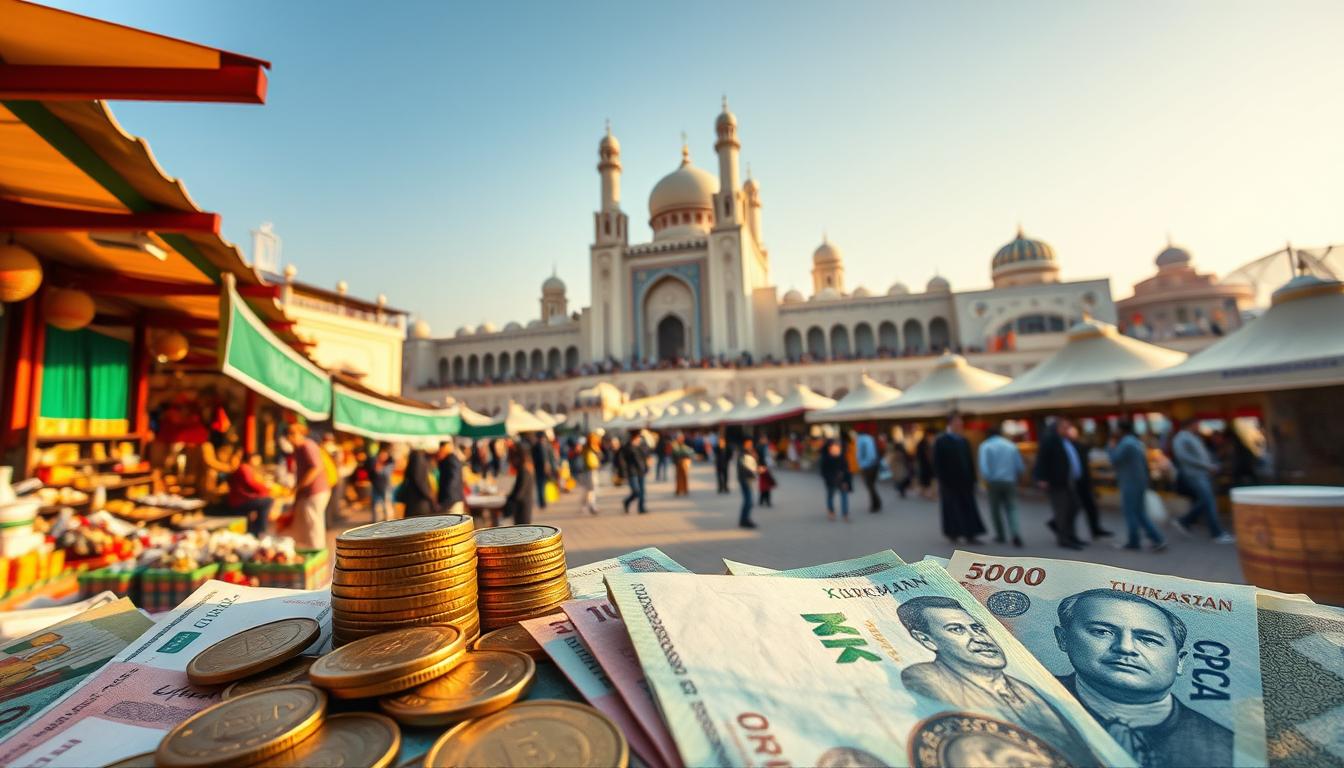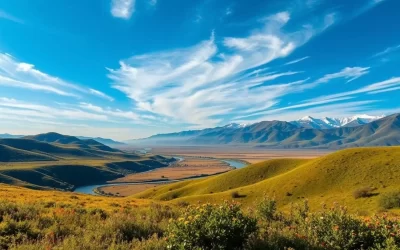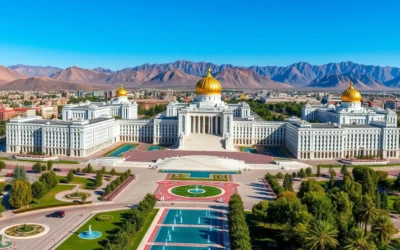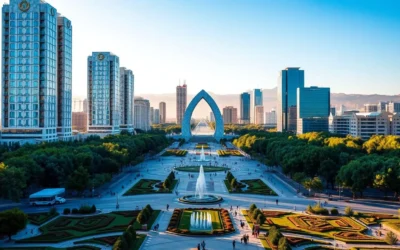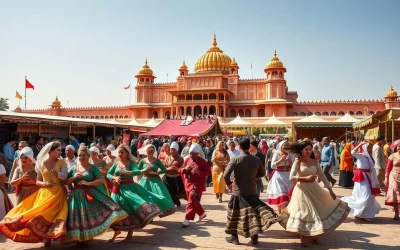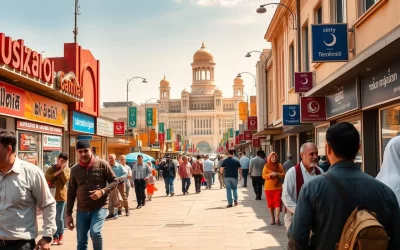✓ Accommodations✓ Flights✓ Rental Cars✓ Tours & Activities
Did you know that only a handful of international ATMs are available in this unique destination? Navigating the financial landscape here can be tricky, but with the right guide, your trip can be seamless and stress-free.
This article is designed to help you understand everything from visa requirements to the best ways to handle money during your stay. Independent travel is restricted, so choosing a reliable tour operator is essential. They can assist with everything from securing your visa to arranging transportation and accommodations.
You’ll also learn about the local currency, the manat, and how to navigate exchange rates. Whether you’re planning to use cash or cards, this guide ensures you’re prepared for every step of your journey. Plus, we’ll share practical tips, like how to save on flights and where to find the best food at a reasonable price.
Designed especially for travelers from the United States, this guide promises detailed insights and authentic recommendations to make your experience unforgettable.
Welcome to Turkmenistan’s Currency and Payment Guide
Understanding how to manage your money here is key to a smooth and enjoyable trip. This guide is designed to simplify the complexities of navigating local currency and payment systems, ensuring you’re well-prepared for your journey.
From securing your visa to choosing the right tour operator, we’ll walk you through every step. Independent travel is restricted, so pre-planning is essential. A reliable tour operator can help with everything from accommodations to transportation.
You’ll also learn about the local currency, the manat, and how to handle exchange rates. Whether you prefer using cash or cards, this guide provides clear, actionable advice to make your travel experience seamless.
“The key to a stress-free trip is understanding the local financial landscape before you arrive.”
Here’s a quick overview of what you’ll find in this guide:
- Tips for managing money and navigating exchange rates.
- Insights into the restricted nature of travel and the importance of pre-planning.
- Practical advice on using cash and cards during your stay.
| Key Topic | What You’ll Learn |
|---|---|
| Visa Process | How to secure your visa and required documents. |
| Currency Exchange | Understanding official vs. black market exchange rates. |
| Payment Methods | When to use cash or cards for food, hotel, and other expenses. |
With expert insights and detailed tips, this guide ensures you’re ready for every aspect of your travel. Let’s make your journey unforgettable!
Planning Your Trip: Visas, Tour Operators, and Travel Preparations
A well-organized trip starts with understanding visa requirements and choosing the right tour operator. Navigating the process can seem daunting, but with the right guide, you’ll be ready for your adventure.
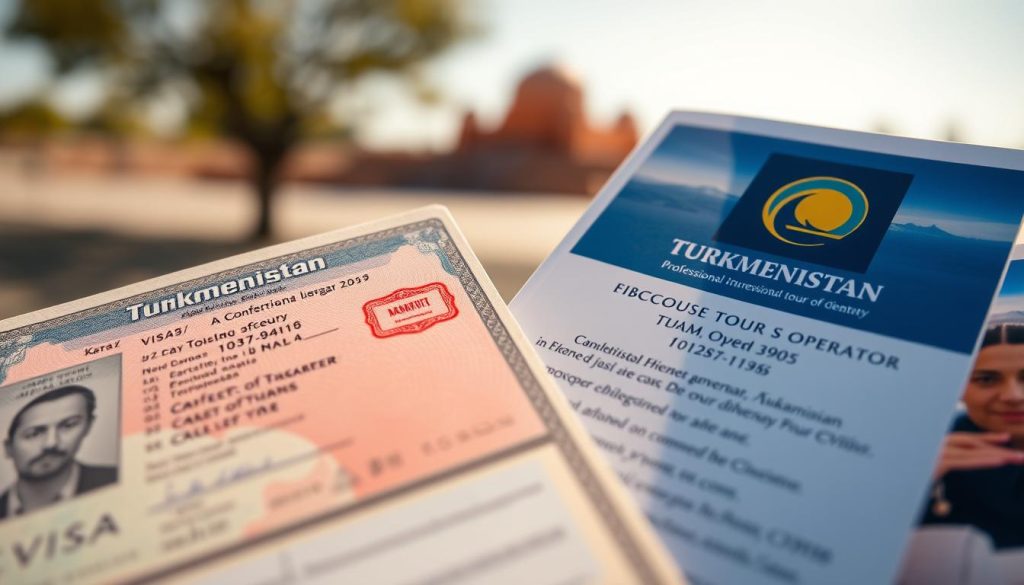
Visa Process and LOI Essentials
Securing a visa for your journey involves multiple steps. The first is obtaining a Letter of Invitation (LOI), which is mandatory for entry. Licensed tour operators, like Ayan Travel, can assist with this process.
The LOI application typically takes 2-3 weeks, and you cannot apply more than 3 months in advance. Once approved, you’ll need to submit your visa application with the required documents. Ensure you have exact cash for fees, as card payments are often not accepted.
Choosing the Right Tour Operator
Selecting a reliable tour operator is crucial for a smooth experience. Operators like Lupine Travel and Young Pioneer Tours handle everything from visa paperwork to pre-trip arrangements. They also provide valuable insights into local customs and logistics.
When deciding between group and private tours, consider your budget and flexibility. Group tours are more cost-effective, while private tours offer personalized itineraries. Both options ensure you have a knowledgeable guide throughout your journey.
| Tour Operator | Services Offered |
|---|---|
| Ayan Travel | LOI assistance, visa processing, and custom itineraries |
| Lupine Travel | Group tours, cultural insights, and logistical support |
| Young Pioneer Tours | Private tours, flexible schedules, and local expertise |
Careful planning and research are key to a successful trip. By understanding the visa process and partnering with a trusted tour operator, you’ll be well-prepared for your journey.
Turkmenistan: Ultimate Travelers Guide to Currencies & Payments
Planning your journey to this unique destination requires more than just packing your bags. This guide is here to help you navigate the financial and logistical aspects of your trip, ensuring a seamless experience from start to finish.
Guide Overview and Key Insights
This guide is designed to simplify your travel preparations. From understanding the local currency to handling money efficiently, we’ve got you covered. The manat is the official currency, and knowing how to manage it can save you time and hassle.
Travelers often face challenges with exchange rates and limited access to ATMs. By planning ahead, you can avoid common pitfalls. For instance, carrying cash is essential, as cards are not widely accepted.
- How to handle currency exchange effectively.
- Practical tips for using cash and cards during your stay.
- The importance of working with a reliable tour operator.
Traveler Testimonials and Tips
Many travelers have shared their experiences to help others prepare better. One visitor noted, “Having a trusted guide made all the difference. They handled everything from visa arrangements to local currency exchanges.”
Another traveler emphasized the importance of carrying cash: “I relied on my card initially, but most places only accepted cash. Exchanging money at the black market offered better rates, but it’s risky.”
Here are some practical tips from seasoned travelers:
- Always carry small denominations of manat for daily expenses like food and transportation.
- Book your flight and hotel through a reputable tour operator to ensure safety and reliability.
- Be prepared for limited ATM access and plan your money accordingly.
| Traveler Tip | Benefit |
|---|---|
| Carry Cash | Ensures smooth transactions in areas where cards are not accepted. |
| Use a Tour Operator | Simplifies visa processing and local logistics. |
| Plan Currency Exchange | Avoids last-minute hassles and ensures better rates. |
By following these insights and tips, you can confidently plan your trip and focus on enjoying the unique experiences this destination has to offer.
Understanding the Turkmen Manat: History and Design
The Turkmen manat has a rich history that reflects the country’s economic and cultural evolution. Introduced in 1993, it replaced the Soviet ruble as the official currency. Over the years, the manat has undergone significant changes, shaping its modern form and usage.
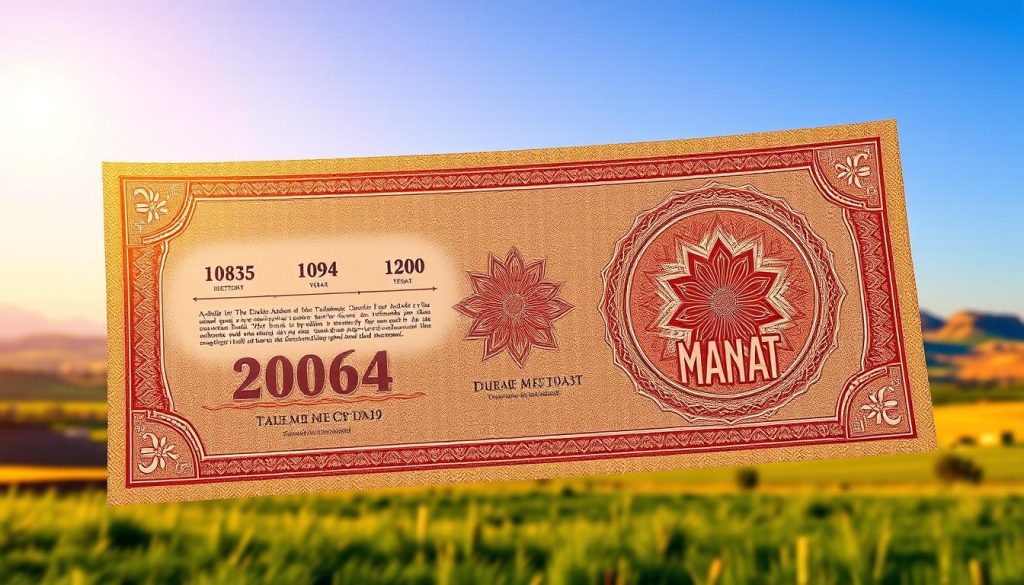
Historical Evolution of the Manat
The manat was first introduced in 1993, marking a new era of financial independence. In 2005, a redenomination took place to simplify the currency system. This process removed zeros from the old notes, making transactions easier for locals and visitors alike.
In 2009, the “New Manat” was launched, featuring updated designs and enhanced security features. This redesign aimed to modernize the currency and reflect the nation’s cultural heritage. Today, the manat remains a symbol of Turkmenistan’s economic stability and pride.
Currency Denominations and Design Features
The manat comes in various denominations, including 1, 5, 10, 20, 50, and 100 notes. Coins are also available, typically used for smaller transactions. The 500 Manat note is rare but highly valued for its unique design and historical significance.
Each note features intricate designs, showcasing Turkmenistan’s landmarks, historical figures, and cultural symbols. These elements not only enhance the currency’s aesthetic appeal but also serve as a reminder of the nation’s rich heritage.
“The manat’s design is a testament to Turkmenistan’s history and cultural identity.”
Understanding the manat’s history and design can help you appreciate its role in daily life. Whether you’re exchanging cash or simply admiring the notes, the manat offers a glimpse into the country’s past and present.
Currency Exchange Dynamics: Official vs. Black Market Rates
Navigating currency exchange can make or break your travel experience. Understanding the differences between official and black market rates is essential for managing your money effectively. This guide will help you make informed decisions and avoid common pitfalls.
Comparing Official and Black Market Rates
The official exchange rate for the manat is USD1 = 3.5 Manat. However, the black market offers a significantly higher rate, around 28 Manat per USD. This stark difference can greatly impact your trip budget.
Many travelers prefer using their tour operator for currency exchange. They often provide better rates than official channels. This approach ensures you get the most value for your money without unnecessary risks.
Best Practices for Currency Exchange
Here are some tips to ensure a smooth and secure exchange process:
- Use trusted channels like your tour operator or reputable exchange offices.
- Avoid unregulated exchanges, as they can be risky and unreliable.
- Carry small denominations of manat for daily expenses like food and transportation.
By following these steps, you can secure the most favorable exchange rate and focus on enjoying your travel experience.
Handling Payments: Cash, Cards, and Practical Tips
Managing your finances during your travel is crucial for a stress-free experience. In this destination, cash remains the primary method of payment, while cards are often unreliable. Understanding the local payment system can save you time and hassle.
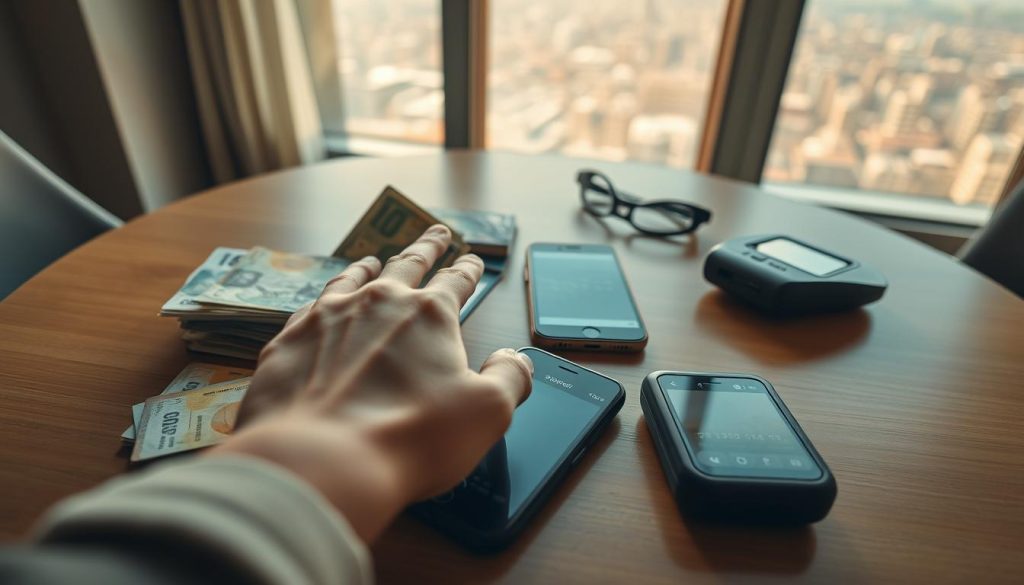
Payment Methods and Their Reliability
Cash is king here. Most businesses, including restaurants and small shops, prefer cash transactions. While some hotels and larger establishments may accept cards, they often process payments at less favorable rates. This can lead to unexpected costs during your stay.
ATMs are scarce, and those that work may have limited functionality. It’s wise to prepare adequate funds in advance. Exchanging money through your tour operator is a reliable option, as they often provide better rates than official channels.
Practical Tips for Managing Payments
Here are some strategies to avoid financial pitfalls:
- Carry small denominations of manat for daily expenses like food and transportation.
- Use your tour operator for currency exchange to secure better rates.
- Limit reliance on cards and always have a backup plan for accessing cash.
“Having enough cash on hand made my trip smoother. I avoided the hassle of finding working ATMs and unexpected card fees.”
By understanding the local payment system and planning ahead, you can ensure smooth transactions and focus on enjoying your travel experience.
Budgeting for Your Trip: Costs and Money Management
Creating a realistic budget is essential for a smooth and enjoyable travel experience. Understanding the costs involved and managing your money wisely can help you avoid financial stress during your journey. Here’s a detailed guide to help you plan effectively.
Start by estimating your major expenses. A round-trip flight can cost around $700, depending on the season. Booking early can save you up to 41% compared to last-minute tickets. Additionally, factor in visa fees, which range from $40 to $160, depending on the type and duration of your stay.
Daily expenses can vary widely. Budget accommodations start at $20 per night, while luxury options can exceed $100. Meals at local restaurants cost around $5-10, while upscale dining may set you back $20 or more. Public transportation is affordable, with bus and train fares at $1-2 per ride.
“Proper budgeting ensures you can focus on enjoying your trip without worrying about unexpected costs.”
Here are some practical tips to manage your money effectively:
- Carry sufficient cash, as cards are not widely accepted and ATMs are scarce.
- Use your tour operator for currency exchange to secure better rates.
- Track your expenses daily to avoid overspending.
- Shop at local grocery stores for affordable food options.
Understanding the difference between official and black market exchange rates is also crucial. While the official rate is USD1 = 3.5 Manat, the black market offers significantly higher rates. However, using trusted channels like your tour operator ensures safety and reliability.
By planning your budget carefully and following these tips, you can enjoy a stress-free travel experience. Whether it’s securing your visa, managing daily costs, or handling money wisely, preparation is key to making the most of your journey.
Staying Connected: Internet Access and Communication Tips
Staying connected during your travels can be a challenge in this region. Internet access is restricted, and connectivity is often expensive. Planning ahead is essential to ensure you can communicate and access information when needed.
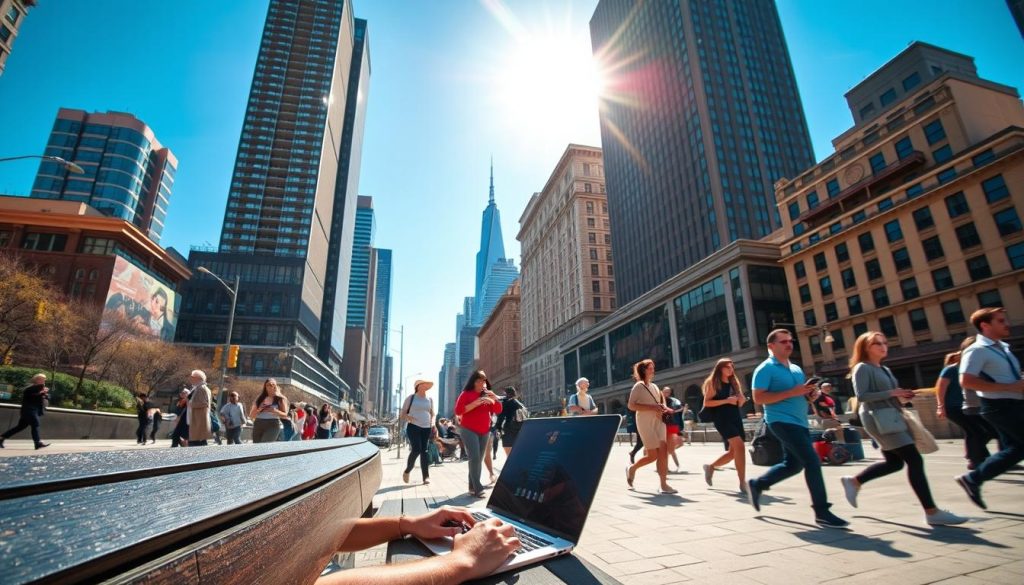
One of the best ways to stay online is by purchasing a local SIM card. TMCELL, the primary provider, offers reliable mobile data services. A SIM card costs around 35 EUR, with additional fees for data packages. Keep in mind that eSIMs are not supported, so a physical SIM is your only option.
Using a VPN is highly recommended to bypass local restrictions on social media and messaging apps. Many platforms, including Facebook and WhatsApp, are blocked. A VPN ensures you can access these services securely.
“Having a local SIM card made all the difference. I could stay connected without worrying about high roaming costs.”
Here are some practical tips for managing your connectivity:
- Purchase a TMCELL SIM card upon arrival for reliable mobile data.
- Use a VPN to access blocked websites and apps.
- Carry a portable charger to ensure your device stays powered.
- Plan your internet usage to avoid unexpected costs.
By preparing for these challenges, you can stay connected and focus on enjoying your travel experience. Whether it’s sharing updates with loved ones or navigating daily activities, reliable communication is key.
Navigating Transport and Road Safety in Turkmenistan
Getting around in this region requires careful planning and awareness of local transport systems. Roads can be challenging, with poor conditions and limited signage. Whether you’re driving or using public transport, understanding the local norms is key to a smooth journey.
Driving Guidelines and Safety Measures
Driving here comes with unique challenges. Rural roads often lack proper maintenance, and night travel is best avoided. Defensive driving is essential, as local practices may differ from what you’re used to.
An international driving permit is required for visitors. Always carry your visa and other identification. Be cautious when driving after dark, as visibility can be poor and hazards are harder to spot.
Public Transportation and Taxi Tips
Public transport is affordable but can be crowded. Buses and trains are reliable for short distances, with fares starting at $1-2. For convenience, taxis are widely available, but it’s important to negotiate fares in advance to avoid overpaying.
Unregulated taxis can pose risks, so stick to reputable services. Your tour operator can recommend trusted drivers. Always confirm the rate before starting your trip to ensure transparency.
“Negotiating taxi fares upfront saved me from unexpected costs and made my travels stress-free.”
Here are some practical tips for navigating transport safely:
- Carry small denominations of money for bus and taxi fares.
- Use your card sparingly, as cash is preferred for most transactions.
- Plan your routes in advance to avoid getting lost in unfamiliar areas.
By following these guidelines, you can confidently explore the region while prioritizing safety and efficiency. Whether you’re driving or relying on public transport, preparation is key to a successful journey.
Conclusion
Your journey begins with careful planning and smart financial decisions. Managing your money wisely and securing your visa are essential steps for a smooth travel experience. Relying on a trusted tour operator can simplify logistics and ensure you’re well-prepared for every aspect of your trip.
Understanding the local currency and exchange practices is crucial. Carrying cash is recommended, as cards are not widely accepted. Practical tips, like staying connected and navigating transport safely, will help you focus on enjoying your adventure.
Refer back to this guide as you prepare for your trip. With proper planning, you can explore confidently and savor every moment, from trying local food to discovering new cultures. Your adventure awaits—make it unforgettable!
The above is subject to change.
Check back often to TRAVEL.COM for the latest travel tips and deals.
